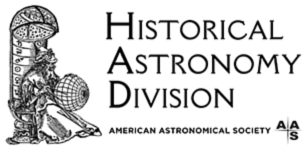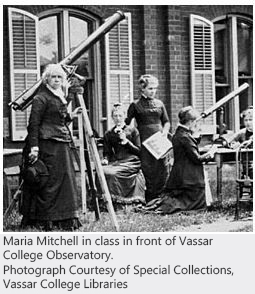This Month in Astronomical History: Miss Mitchell’s Comet
Teresa Wilson United States Naval Observatory
 Each month as part of this new series from the Historical Astronomy Division of the AAS, an important discovery or memorable event in the history of astronomy will be highlighted. This month, we look at the life of Maria Mitchell.
Each month as part of this new series from the Historical Astronomy Division of the AAS, an important discovery or memorable event in the history of astronomy will be highlighted. This month, we look at the life of Maria Mitchell.
 The night of 1 October 1847 began as a usual evening for Maria Mitchell, out on the rooftop of her parent’s house in Nantucket, Massachusetts, scanning the night sky with her family’s small telescope. At 10:30 pm, a blurry object streaked across the sky and took with it the obscurity that would otherwise have cloaked this amateur astronomer. In her own way, Mitchell embodied the "American dream," following her passion for astronomy and advancing from amateur to professional astronomer, and then using her position to advocate for those who needed a helping hand in society.
The night of 1 October 1847 began as a usual evening for Maria Mitchell, out on the rooftop of her parent’s house in Nantucket, Massachusetts, scanning the night sky with her family’s small telescope. At 10:30 pm, a blurry object streaked across the sky and took with it the obscurity that would otherwise have cloaked this amateur astronomer. In her own way, Mitchell embodied the "American dream," following her passion for astronomy and advancing from amateur to professional astronomer, and then using her position to advocate for those who needed a helping hand in society.
Mitchell was born into a large Quaker family residing in Massachusetts in 1818. Because she showed an aptitude for mathematics and the sciences during her early years, she received the best scientific education her parents could provide in accordance with the Quakers' values of equal education for both sexes. She shared her father's love of astronomy and regularly spent evenings observing with him. In 1836, Maria started work as a librarian at the newly opened Nantucket Atheneum giving herself the equivalent of a college education over the next 20 years and making the acquaintances of authors such as Herman Melville and Nathaniel Hawthorne.
While comets were nothing new to astronomers at the time, the king of Denmark, Frederick VI, had upped the stakes. An amateur astronomer himself, he offered a medal to the first person to discover any new comet to promote the advancement of Science. His successor Christian VIII continued this tradition. When Mitchell saw the comet on the night of 1 October and confirmed that it was, in fact, a comet, her father was very eager to get her the recognition she was due. He contacted Professor William Bond at Harvard University, who then reported her discovery to the proper European authorities. Meanwhile in Europe, Father Francesco deVico was submitting his own paperwork after seeing the comet on 3 October from Rome. On 7 October, W. R. Dawes spotted the comet in England followed by the wife of Charles Rümker, the director of Hamburg Observatory on 11 October. After verifying that Mitchell had detected the comet first, King Christian VIII awarded her the medal. Thus, Comet 1847-VI became more commonly known as "Miss Mitchell's comet."
In the United States, Mitchell was recognized by being the first female elected to the American Association of Arts and Sciences in 1848 and by being one of the first female members of the American Association for the Advancement of Science (AAAS) in 1850.
Mitchell's discovery began her transformation from an unknown amateur astronomer to America's first female professional astronomer. In 1849, she calculated positions of Venus for the US Nautical Almanac Office (now the US Naval Observatory) so that sailors could more accurately determine where they were. She was the first person appointed to the faculty of the newly established Vassar College in 1865. She taught astronomy there until her retirement a year before her death in 1889, advocating for women's rights, and cofounding the American Association for the Advancement of Women. The fame from her discovery put her in the social and scientific spotlight and Mitchell stepped up to become an inspiring figure in both worlds. A true American, she followed her passion for astronomy and did what she could to bring those who deserved it out of obscurity.
Each month is an exciting new adventure into the archives of astronomical history, but before I continue any further, I would appreciate your feedback to ensure my writing is reaching the largest audience possible. Please participate in a brief questionnaire (5-10 minutes) about the style and content. You may also submit any suggestions for future topics. Thank you!

